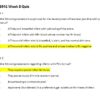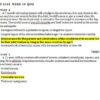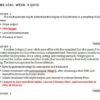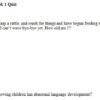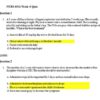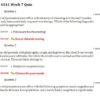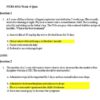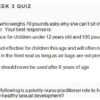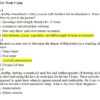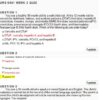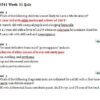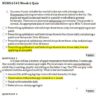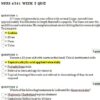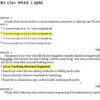Description
NURS 6541 Week 7 Quiz – Question with Answers
- Shelby is a healthy 4-week-old who presents to your office in mid-January with a 3-day history of nasal congestion with occasional cough. She started running a low-grade fever last night (T max 101.5°F). Now she is refusing to nurse and has paroxysmal coughing and noisy/labored breathing. Physical exam reveals an ill-appearing infant with lethargy and tachypnea, intercostal retractions, expiratory wheezes, and occasional rales. She does not attend day care but has a 3-year-old sibling who does and who recently had a “cold.” What is the MOST LIKELY cause of Shelby’s illness?
- You are on call and receive a phone call from the parents of a 13-year-old known asthmatic. She has been having chest tightness and a worsening cough for 48 hours. She-has significant nasal discharge that began 14 days ago and intermittent complaint of headache. She is now running a low-grade fever. Her peak flow the last 48 hours is 70–80% of personal best. Her temperature right now is 101.7°F. She is on salmeterol with corticosteroid (Advair) and PRN albuterol. Which of the following is most appropriate?
- A 3-year-old presents to your office with a history of wheezing over the last 3 months and has only been moderately responsive to therapy. Which of the following diagnostic tests would be appropriate?
- Which of the following symptoms are most suggestive of pneumonia in a young child?
- Hope is a 7-month-old who presents in January with a 1-day history of cough, yellow nasal discharge, and low-grade temp (T max 100°F). She was previously healthy. She does have 2+ edema of the nasal turbinates and cloudy rhinorrhea. She-is afebrile in the office. Her chest, mouth, and ears are clear. You prescribe:
- A 7-year-old presents with abrupt fever, stridor, drooling, and hyperextension of the neck. You examine the nose and throat and notice one tonsil is enlarged and there is marked erythema of the pharynx with uvular deviation. Which is most appropriate?
- Anthony is a known asthmatic. He has symptoms three times a week but never more than once a day. Exacerbations affect his normal activities occasionally. He awakens with cough three to four times a month. You classify his asthma as:
- In children who have not received antibiotics in the past month, which antibiotic is recommended by the Centers for Disease Control and Prevention for the management of acute bacterial respiratory infection?
- A 2-year-old presents with a history of wheezing and persistent cough. The father reports the child had a coughing/choking episode about a week ago that was spontaneously resolved. A few days later she began to cough and wheeze. This scenario is most consistent with: nurs 6541 week 7 quiz
- A 2-year-old presents to your office with the following symptoms: nasal congestion and rhinorrhea for 48 hours, low-grade fever, and a harsh/barky cough that is significantly worse at night. Inspiratory stridor is present and she has clear but slightly decreased breath sounds. Which of the following treatments is best?



